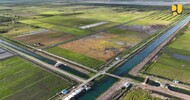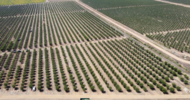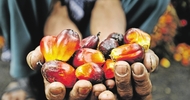Human rights organizations and parliamentarians from West African countries and Zambia in East Africa have expressed interest in Sierra Leone’s new land laws and efforts to resist and negotiate better terms with international companies.
We depend on land for food, shelter and work, it’s a cultural marker and a source of identity – but also a site of violence and anguish. It’s time for a reckoning.
- New Internationalist
-
24 October 2022
We can no longer afford to pour billions in public money into projects that exacerbate debt, inequalities, poverty and climate change
- OpenDemocracy
-
19 January 2022
Villagers in Cameroon have been going through a night mare to find what to eat on a daily basis after their lands were taken for a Chinese rice project over a decade ago.
- Journal du Cameroun
-
27 October 2021
In Colombia, big agribusinesses, cattle ranchers, transnational corporations, and wealthy landowners have been able to claim land that is not theirs by acquiring titles through a legal system farming families have no access to.
- Labour Notes
-
08 January 2021
On the eve of their shareholder meetings, more than 40 organisations sign a collective statement about the situation in numerous rubber and oil palm plantations run by the Socfin group, with the financial participation of the Bolloré group
UkrLandFarming has been facing hard times due to complicated situation around its owner Oleh Bakhmatyuk, a Ukrainian businessman who is active in several businesses including agriculture, mass media, and finance.
- largescaleagriculture.com
-
05 Mar 2020
Giant dam and irrigated sugar plantations mean people in lower Omo valley face starvation and conflict, says US thinktank
In 2011, three village communities in eastern-central Côte d’Ivoire learned that a Belgian corporation called SIAT was about to move onto their land without their consent.
- IDEF et al.
-
12 December 2017
Thousands of acres of agricultural land will be leased out to Chinese enterprises to set up demonstration projects in areas ranging from seed varieties to irrigation technology.
FAO expert says it would be wrong to conclude that investors’ interest in agriculture has vanished and developing countries and donors should do more to ensure responsible investment and confront domestic “land grabbers".
Are foreign investors really snatching up as much of Africa as they can? It’s not that simple, Foreign Policy reports.
- Foreign Policy
-
20 October 2015
In Liberia, palm oil has set off a dangerous scramble for land
- Aljazeera
-
05 October 2015
Activists tracking these deals say rich countries are buying up land—93 million acres—and displacing local people and wildlife.
Chinese company's takeover of Australian farmland and firms draws mixed reaction from Australia ministers.
Governments in a number of countries are trying to address concerns about land grabbing by closing their borders to foreign investors. Are these restrictions effective? Not really, says GRAIN.
This piece is part of "Water Grabbers: A Global Rush on Freshwater", a special National Geographic News series on how grabbing land—and water—from poor people, desperate governments, and future generations threatens global food security, environmental sustainability, and local cultures.
- National Geographic
-
14 December 2012
Australia risks losing an opportunity to become a farmyard for Asia, as growing unease over foreigners buying rural land threatens to provoke protectionist policies.
In debate over large scale investments in agriculture in Australia, there are some broader issues about foreign investment that don’t seem to get talked about enough.
Largest cut flower exporter Karuturi Global ventures into food business
- Business Today
-
28 Mar 2012
IP-rich New Zealand is a logical partner for resource-rich Gulf states as a producer of food in places like Africa, says New Zealand's Minister of Foreign Affairs.
- NZ Government
-
01 Mar 2012
African farmers do need investment and support. They desperately need decent roads and access to local markets, processing equipment to add value to their own diverse farm produce, storage and drying facilities to prevent post-harvest losses, and basic amenities such as schools and health centres and water wells to improve rural lives, so that farming communities can thrive. But foreign investors are not in business to provide any of these things.
Internationally-funded Guatemalan palm oil and sugar cane interests evict Mayan Qeqchi families from their historic lands, destroying homes and crops, killing one, injuring more, while thousands are without food or shelter.
- Upside Down World
-
23 Mar 2011
These ‘food pirates’ come with bags full of foreign direct investment and are moving swiftly where land is available, investing in crops that can be shipped back home.
- Governance Now
-
02 Mar 2011
In Mozambique, there has been an unofficial halt to new large land grants.
- CIP & AWEPA
-
22 February 2011
Ethiopia must harness its enormous agricultural potential, not by selling it off as a cheap commodity, but by supporting farmers in growing culturally appropriate crops for domestic markets, using agro-ecologically sustainable farming methods.
- FoodFirst
-
04 February 2010
Land grabbing by transnational capital must stop.
- People's Food Sovereignty
-
17 November 2009
GCC countries face growing constraints in agricultural capacity. Structural factors are exacerbating pressures on food prices. A new report from Standard Chartered supports additional investment in agriculture.
- Business Intelligence Middle East
-
09 September 2008
EBRD funds Ukrfarm, a subsidiary of the Renaissance Group, to bring an additional 50,000 hectares of land in the Ukraine into crop production.
- The Financial
-
02 July 2011
Over the past few years Laos has seen a surge of foreign investment in farms and plantations from neighboring countries keen to acquire rubber, sugar, and other agricultural commodities. Under this project, noncommercial details of land concession awards will be posted on a public website to improve transparency, while the commercial terms will be kept in a confidential database for monitoring compliance.
- The Financial
-
24 February 2009















